Unit 1 Advertising Grammar and usage 课件-优质公开课-译林版高中必修4精品
高中英语译林版必修五Unit-1-Grammar-and-usage-To-infinitive课件

及物动词时,其后须加上适当的介词,构成及物动词短语。 如:
I am looking for a room to live in.
I need a piece of paper to write on.
名 师 课 件 免 费课件 下载优 秀公开 课课件 高中英 语译林 版必修 五Unit -1-Gra mmar-a nd-usa ge-To- infini tive课 件(共1 7张PPT )
非 1.不定式:多表特定的、具体的、将来的动作。
谓 2.动名词:接近于名词,多表抽象的、习惯性
语
的动作。
非谓语动词的形式
to do to be doing to have done to have been doing doing having done
to be done
to have been done
being done having been done done
名 师 课 件 免 费课件 下载优 秀公开 课课件 高中英 语译林 版必修 五Unit -1-Gra mmar-a nd-usa ge-To- infini tive课 件(共1 7张PPT )
4. The ability _t_o__e_x__p_r_e(sesxpress) an idea is as important as the idea itself.
名 师 课 件 免 费课件 下载优 秀公开 课课件 高中英 语译林 版必修 五Unit -1-Gra mmar-a nd-usa ge-To- infini tive课 件(共1 7张PPT )
译林版高一英语必修第一册(2019版)_Unit1_Grammar_and_usage_课后习题
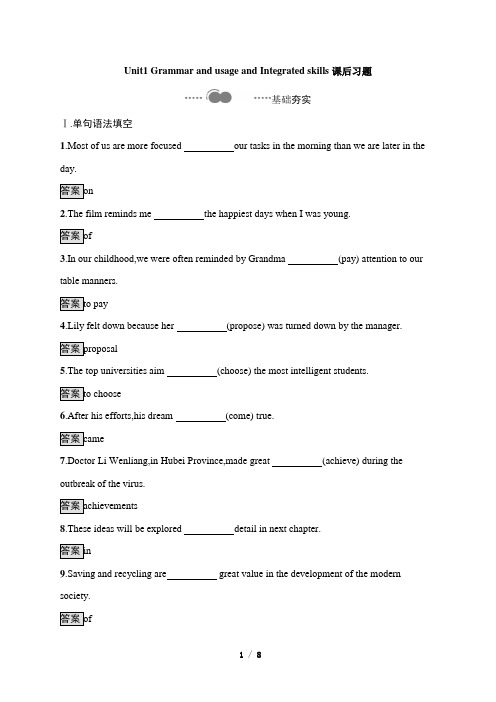
Unit1 Grammar and usage and Integrated skills 课后习题基础夯实Ⅰ.单句语法填空1.Most of us are more focused our tasks in the morning than we are later in the day.2.The film reminds me the happiest days when I was young.3.In our childhood,we were often reminded by Grandma (pay) attention to our table manners.4.Lily felt down because her (propose) was turned down by the manager.5.The top universities aim (choose) the most intelligent students.6.After his efforts,his dream (come) true.7.Doctor Li Wenliang,in Hubei Province,made great (achieve) during the outbreak of the virus.8.These ideas will be explored detail in next chapter.9.Saving and recycling are great value in the development of the modern society.10.If you follow me,you will make greater (succeed).11.(profession)spent more time on the research.12.They asked me to design a (post) for the activity.Ⅱ.短语填空1. the heavy rain,the football match was put off.2.After his retirement,he can his personal interests.3.Whatever happens,we’ll our promise.4.His dream of becoming a university teacher has .5.You’ll be able to choose a room your own personal taste.6.Even if the child’s access to schooling is difficult,you should not .7.To our satisfaction,his efforts on his children will .8.We to be there around six.Ⅲ.完成句子1.他们成功地克服了各种困难。
Unit+1+Grammar+and+Usage+句子成分和结构牛津译林版(2020)必修第一册

时间状语
• I was late because of the traffic jam .
原因状语
• We'll send a car to fetch you.
目的状语
• The fish can eat a person in two minutes, leaving only bones.
结果状语
② He seems interested in the book. 么”,
“怎么样” 。
③ Silk feels soft and smooth.
④ The weather becomes cool.
⑤ She always stays calm when facing danger.
⑥ The truth is that he is missing.
系动词分类
1) 表状态的be动词:be,is,am,are,was,were 2)表感官的动词: look, sound, taste, smell, feel, 3)表变化的动词: become, get, turn, go,grow,come 4)表持续的动词: remain, stay, keep, continue 5)表表像的动词: seem, appear (似乎,好像) 6)表终止的动词: prove, turn out(证明)
基本句型三 主+谓+宾语+宾语补足语
① You make me happy. ② They call me John. ③ We should keep the table clean. ④ The noise drives me crazy. Conclusion: 动词虽然是及物动词,但是只跟一个宾语还不能表 达完整的意思,必须加上一个补充成分来补足宾语,才能使意思 完整。
高中英语精品公开课高一英语牛津译林版2020 必修二 Unit1Grammar and usage

behind the scenes
1. 在后台,在幕后 2. 大量的艰辛工作 3. 给某人作简单介绍 4. 对…熟悉 5. 首先 6. 吸引某人的注意力于 7. 重视,认为…重要 8. 视觉特效 9. 把…和…分开 10. 使某人能够做
behind the scenes a huge amount of hard work
1. 在后台,在幕后 2. 大量的艰辛工作 3. 给某人作简单介绍 4. 对…熟悉 5. 首先 6. 吸引某人的注意力于 7. 重视,认为…重要 8. 视觉特效 9. 把…和…分开 10. 使某人能够做
behind the scenes a huge amount of hard work give sb. a brief introduction to be familiar with to begin with draw one’s attention to
1. 在后台,在幕后 2. 大量的艰辛工作 3. 给某人作简单介绍 4. 对…熟悉 5. 首先 6. 吸引某人的注意力于 7. 重视,认为…重要 8. 视觉特效 9. 把…和…分开 10. 使某人能够做
behind the scenes a huge amount of hard work give sb. a brief introduቤተ መጻሕፍቲ ባይዱtion to be familiar with to begin with draw one’s attention to attach great importance to visual special effects separate A from B enable sb. to do
1. 在后台,在幕后 2. 大量的艰辛工作 3. 给某人作简单介绍 4. 对…熟悉 5. 首先 6. 吸引某人的注意力于 7. 重视,认为…重要 8. 视觉特效 9. 把…和…分开 10. 使某人能够做
译林版高中英语选必三Unit1 Grammar and usage 教案
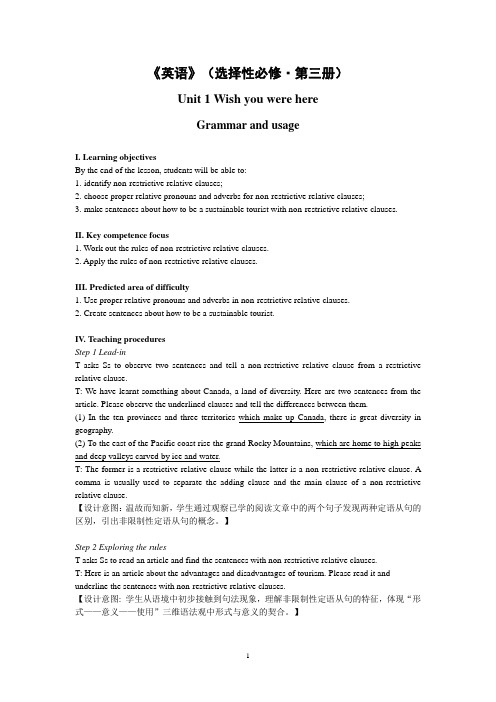
《英语》(选择性必修·第三册)Unit 1 Wish you were hereGrammar and usageI. Learning objectivesBy the end of the lesson, students will be able to:1.identify non-restrictive relative clauses;2.choose proper relative pronouns and adverbs for non-restrictive relative clauses;3.make sentences about how to be a sustainable tourist with non-restrictive relative clauses.II. Key competence focus1. Work out the rules of non-restrictive relative clauses.2. Apply the rules of non-restrictive relative clauses.III. Predicted area of difficulty1. Use proper relative pronouns and adverbs in non-restrictive relative clauses.2. Create sentences about how to be a sustainable tourist.IV. Teaching proceduresStep 1 Lead-inT asks Ss to observe two sentences and tell a non-restrictive relative clause from a restrictive relative clause.T: We have learnt something about Canada, a land of diversity. Here are two sentences from the article. Please observe the underlined clauses and tell the differences between them.(1) In the ten provinces and three territories which make up Canada, there is great diversity in geography.(2) To the east of the Pacific coast rise the grand Rocky Mountains, which are home to high peaks and deep valleys carved by ice and water.T: The former is a restrictive relative clause while the latter is a non-restrictive relative clause. A comma is usually used to separate the adding clause and the main clause of a non-restrictive relative clause.【设计意图:温故而知新,学生通过观察已学的阅读文章中的两个句子发现两种定语从句的区别,引出非限制性定语从句的概念。
外研版 必修一 unit 1 Grammar and usage教案
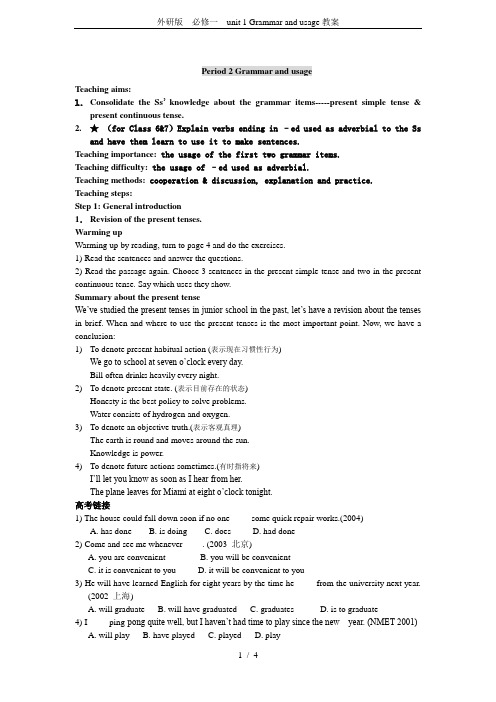
Period 2 Grammar and usageTeaching aims:1.Consolidate the Ss’knowledge about the grammar items-----present simple tense &present continuous tense.2.★(for Class 6&7)Explain verbs ending in –ed used as adverbial to the Ssand have them learn to use it to make sentences.Teaching importance: the usage of the first two grammar items.Teaching difficulty: the usage of –ed used as adverbial.Teaching methods: cooperation & discussion, explanation and practice.Teaching steps:Step 1: General introduction1.Revision of the present tenses.Warming upWarming up by reading, turn to page 4 and do the exercises.1) Read the sentences and answer the questions.2) Read the passage again. Choose 3 sentences in the present simple tense and two in the present continuous tense. Say which uses they show.Summary about the present tenseWe’ve studied the present tenses in junior school in the past, let’s have a revision about the tenses in brief. When and where to use the present tenses is the most important point. Now, we have a conclusion:1)To denote present habitual action (表示现在习惯性行为)We go to school at seven o’clock every day.Bill often drinks heavily every night.2)To denote present state. (表示目前存在的状态)Honesty is the best policy to solve problems.Water consists of hydrogen and oxygen.3)To denote an objective truth.(表示客观真理)The earth is round and moves around the sun.Knowledge is power.4)To denote future actions sometimes.(有时指将来)I’ll let you know as soon as I hear from her.The plane leaves for Miami at eight o’clock tonight.高考链接1) The house could fall down soon if no one ____ some quick repair works.(2004)A. has doneB. is doingC. doesD. had done2) Come and see me whenever ____. (2003 北京)A. you are convenientB. you will be convenientC. it is convenient to youD. it will be convenient to you3) He will have learned English for eight years by the time he ____ from the university next year.(2002 上海)A. will graduateB. will have graduatedC. graduatesD. is to graduate4) I ____ ping-pong quite well, but I haven’t had time to play since the new year. (NMET 2001)A. will playB. have playedC. playedD. play5) --You are drinking too much.--Only at home. No one ____ me but you. (2000 北京)Warming up1) Warming up by reading My First Day at Senior High again and underline the adjectives with–ing or –ed endings.2) Warming up by choosingA. The –ing form describes characteristics of thingsB. The –ed form describes the characteristics of peopleC. The –ing form describes the people or things that cause the feelingYou may see the –ing or –ed forms of verbs from time to time in our reading materials used as adjectives as predicative to express the characteristics of something or somebody, but do youTheir regulation in usage can be shown in following patterns:sb. + be + -ed (the –ed form describes people)sth. + be + -ing(the –ing form describes things)高考链接I used to play ping-pong a lot in my spare time, but now I’m interesting in football. (1997Step2: Exercises for consolidation1. Exercises for the present tense1. I ____ to have another try if I can get another chance.A. have been meaningB. meanC. am meaningD. meant2. ____ your broken leg.A. Do be careful ofB. Do care forC. Be carefulD. To be care full to3. It’s the third time that you ____ late for school this week.A. wereB. areC. had beenD. have been4. I won’t go home until I ____ the job.A. have doneB. had doneC. have beenD. are5. These kinds of shoes ____ well.A. don’t sellB. are not sellC. won’t be soldD. were not sold6. A quarrel ____ between the two neighbors.A. broke outB. was broken outC. is breaking outD. is broken out7. How long do you think the meeting ____ ?A. lastsB. will lastC. is lastedD. is lasting8. Our school yard ___ an area of 1,500 square meters.A. coversB. is coveredC. extendsD. is extended9. While this tough meat is being cooked, more water should ____ it.A. add toB. be added toC. had been added up toD. will be added to10. They left for Beijing last week and we ____ them so far.A. don’t hear fromB. didn’t hear fromC. haven’t heard fromD. won’t hear from11. You are very busy. I ____ you ____ hard for your experiment.A. suppose, are workingB. am supposing, are workingC. am supposing, workD. suppose, work12. My brother ____ a lot. He ____ a new novel at the moment.A. reads, readsB. reads, is readingC. is reading, is readingD. is reading, read13. Perhaps it will be a long time ____ from abroad.A. when Tom comes backB. when Tom will come backC. before Tome comes backD. that Tom comes back14. There ____ the bus. Harry up.A. is comingB. comeC. comesD. had come15. If you ____ over there for a moment, the manager will be here soon.2. Exercises for the participlesTranslate the following into English by using the–ing or –ed forms of verbs. They are used not only as predictive but also as complements of object, but the regulation is similar.1)你讲的这个事情很有意思。
高一英语《unit1---Grammar and usage》

➢ learn about the functions of ellipsis; ➢ summarize the general rules of ellipsis; ➢ apply the rules of ellipsis in the new
context.
P6
A Exploring the rules
4 从属连词when、where、if、than 等后常用省略结 构。如: You should be careful when (you are) crossing the road. You need to make improvements where (it is) necessary. Please call me back if (it is) possible. I love English more than (I) ever (loved English).
What is ellipsis? When can we use ellipsis? What’s the function of ellipsis?
Possible answer
Ellipsis means the act of leaving out a word or words from a sentence deliberately. We can use ellipsis when the meaning can still be understood without using a word or certain words. In other words, ellipsis is used when you do not want to repeat some words or phrases whose meaning is obvious. Using ellipsis is an efficient way to make sentences concise.
译林版高中英语必修二Uint1 Grammar and usage 教案(雅礼版)

Possible answer:
New film uses much more advanced technology—not only the animals but also the jungle is digitally created.
plete the table in part A.
主谓一致补充:
一、含义
在句子中谓语动词的数必须和主语的数保持一致。
二、三个原则
1.语法一致原则
主语是单数,谓语动词用单数;主语是复数,谓语动词用复数。
2.意义一致原则
主语形式为单数,意义是复数,谓语动词用复数;主语形式为复数,意义是单数,谓语动词用单数。
3.就近原则
牛津译林版(2020)高中英语选择性必修第一册 Unit1Grammar and usage课件

at a restaurant.
When I picked a popular recipe and My plan is to invite my friends
gave it a try, I discovered that it was over at the weekend to show
not that difficult to make a simple them my new-found skills.
4. 主语和表语可以同时为动词不定式。如: To see is to believe.
Applying the rules
B1 (1) The next dish that the cook will prepare is Kung Pao Chicken. (attributive). The next dish to be prepared by the cook is Kung Pao Chicken.
(5) I consider the Soup of the Day as the best option on the menu. (object complement) I consider the Soup of the Day to be the best option on the menu.
following sentences from the blog entry of Part A.
object complement
• (1) To eat out was also a social activity, allowing me to enhance
the relationship with my friends.
译林版高中英语选必二Unit1 Grammar and usage (II) 教案(雅礼版)
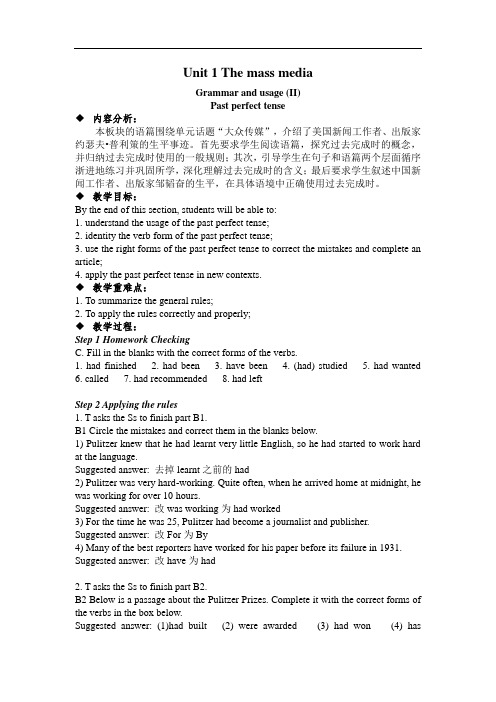
Unit 1 The mass mediaGrammar and usage (II)Past perfect tense◆内容分析:本板块的语篇围绕单元话题“大众传媒”,介绍了美国新闻工作者、出版家约瑟夫•普利策的生平事迹。
首先要求学生阅读语篇,探究过去完成时的概念,并归纳过去完成时使用的一般规则;其次,引导学生在句子和语篇两个层面循序浙进地练习并巩固所学,深化理解过去完成时的含义;最后要求学生叙述中国新闻工作者、出版家邹韬奋的生平,在具体语境中正确使用过去完成时。
◆教学目标:By the end of this section, students will be able to:1.understand the usage of the past perfect tense;2.identity the verb form of the past perfect tense;e the right forms of the past perfect tense to correct the mistakes and complete an article;4.apply the past perfect tense in new contexts.◆教学重难点:1.To summarize the general rules;2.To apply the rules correctly and properly;◆教学过程:Step 1 Homework CheckingC.Fill in the blanks with the correct forms of the verbs.1. had finished2. had been3. have been4. (had) studied5. had wanted6. called7. had recommended8. had leftStep 2 Applying the rules1. T asks the Ss to finish part B1.B1 Circle the mistakes and correct them in the blanks below.1) Pulitzer knew that he had learnt very little English, so he had started to work hard at the language.Suggested answer: 去掉learnt之前的had2) Pulitzer was very hard-working. Quite often, when he arrived home at midnight, he was working for over 10 hours.Suggested answer: 改was working为had worked3) For the time he was 25, Pulitzer had become a journalist and publisher. Suggested answer: 改For为By4) Many of the best reporters have worked for his paper before its failure in 1931. Suggested answer: 改have为had2. T asks the Ss to finish part B2.B2 Below is a passage about the Pulitzer Prizes. Complete it with the correct forms of the verbs in the box below.Suggested answer: (1)had built (2) were awarded (3) had won (4) hasbeen allowed (5) had intended3. After finishing the box, T asks the Ss to answer the following questions:1) Who had devoted a lot before The Pulitzer Prizes were established?Suggested answer: Joseph Pulitzer.2) What categories have The Pulitzer Prizes also expanded to include?Suggested answer: Photography and music.【设计意图:这个步骤是这堂课的核心部分,将语法知识和语境相结合,在语境中学习语法知识。
译林版高中英语必修一Unit1 Grammar and usage (I) 教案(雅礼)
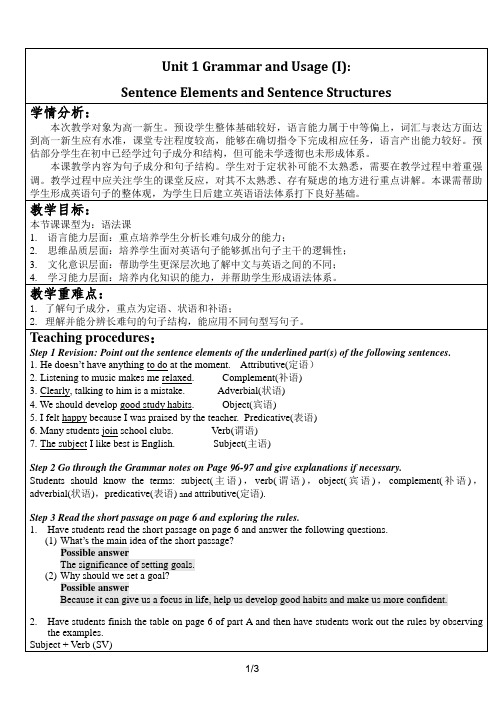
3.Clearly, talking to him is a mistake.Adverbial(状语)
4. We should developgood study habits.Object(宾语)
ask, bring, buy, cost, give, hand, lend, pass, pay, read, return, sell, send, show, take, teach, tell, write…
(2)Make sentences using S+V+IO+DO structure.
Practice
Complete the following sentences with proper object complements.
1. She felt somethingclimbingon her skin.
2. Justine named his grandsonMax.
3. My classmates painted the back wallwhite.
本课教学内容为句子成分和句子结构。学生对于定状补可能不太熟悉,需要在教学过程中着重强调。教学过程中应关注学生的课堂反应,对其不太熟悉、存有疑虑的地方进行重点讲解。本课需帮助学生形成英语句子的整体观,为学生日后建立英语语法体系打下良好基础。
教学目标:
本节课课型为:语法课
1.语言能力层面:重点培养学生分析长难句成分的能力;
3.Find thesubjectsandthe verbsof the following sentences.
(1)Youwill discoveryour potential while you develop as a student and as a person.
Unit1Grammarandusage课件高中英语牛津译林版(2020)

2.谓语(verb/predicate)
说明主语的动作、状态和特征 (“做什么”“是什么”或“怎么样”)
情态动词
动词的分类
助动词 系动词 实义动词
及物动词 不及物动词
(1)简单谓语:由一个动词或动词短语构成 He practices running every morning.
(2)复合谓语:由情态动词或助动词加动词原形构成 You may keep the book for two weeks.
(1) She has lunch happily. (2) He arrived in London yesterday..
SVP 主语+系动词+表语
此类型的句子,谓语动词不能表达一个完整的意思,必须加 上一个表明主语性质或状态的表语,才能表达完整的意思。
常见的系动词: be动词类: am, is , are , was, were 感官动词类:look, sound, smell, taste, feel
可接“双宾语”的动词 (1)V.+sb.+sth.=V. +sth. + to + sb.
give, tell, lend, sell, teach, send, bring, write, take, offer, pass, return, promise, show, throw, hand, award等
5.定语(attributive) 修饰或限制名词或代词,翻译成
“……的”
由名词、代词、数词、形容词、副词、介词短语、V-ing、Ved、不定式、定语从句等充当。
This is an apple tree.
(名词)
He is our friend.
高一英语Unit1 Advertising Grammar and usage教学设计1
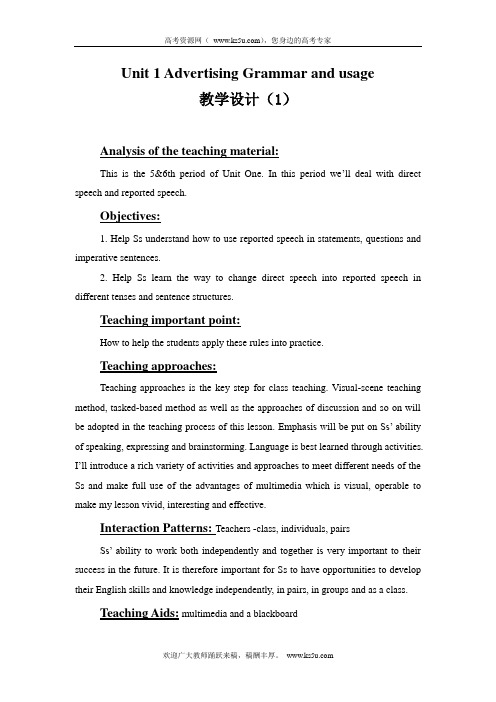
高考资源网(),您身边的高考专家Unit 1 Advertising Grammar and usage教学设计(1)Analysis of the teaching material:This is the 5&6th period of Unit One. In this period we’ll deal with direct speech and reported speech.Objectives:1. Help Ss understand how to use reported speech in statements, questions and imperative sentences.2. Help Ss learn the way to change direct speech into reported speech in different tenses and sentence structures.Teaching important point:How to help the students apply these rules into practice.Teaching approaches:Teaching approaches is the key step for class teaching. Visual-scene teaching method, tasked-based method as well as the approaches of discussion and so on will be adopted in the teaching process of this lesson. Emphasis will be put on Ss’ ability of speaking, expressing and brainstorming. Language is best learned through activities. I’ll introduce a rich variety of activities and approaches to meet different needs of the Ss and make full use of the advantages of multimedia which is visual, operable to make my lesson vivid, interesting and effective.Interaction Patterns: Teachers -class, individuals, pairsSs’ ability to work both independently and together is very important to their success in the future. It is therefore important for Ss to have opportunities to develop their English skills and knowledge independently, in pairs, in groups and as a class.Teaching Aids: multimedia and a blackboard欢迎广大教师踊跃来稿,稿酬丰厚。
英语:unit1advertising-grammar and usage教案(牛津译林版必修4)

Grammar and UsageTeaching Aims:l To learn the direct and indirect speech and how to change from one to the otherl To identify the differences between direct and in direct speechl To learn how to use reported speech in statements, questions, and imperative sentences l To complete the relevant written tasks to reinforce the grammar and usagel To apply what they learn to practice by fulfilling some written mistakes.Teaching Key Points & Teaching Difficulties:²How to help them understand the changes when changing direct speech into indirect speech ²The usages of persuade and discourage²How to apply the grammar rules to compete the related exercises correctlyTeaching Procedure:Step One: Leading-inT: (Greet the class as usual) Now boys and girls, please look at the screen. There is a short dialogue. Read it carefully and answer the two questions.‘What are you going to do this summer holiday,’ Tom asked Ann. ‘I am going to travel toBeijing with my parents.’ said Ann.Ø What did Tom ask Ann?Ø What did Ann say?Ss: …(This step is to attract their attention to direct speech and indirect speech. Later collect theiranswers on screen.)Suggested Answers:üTom asked Ann what she was going to that summer holiday.üAnn said that she was going to travel to Beijing with her parents.T: Wonderful! Yon can notice that when you answer my questions you have made some changes to the original sentences. In fact your answers are written in reported speech orindirect speech while the original sentences in direct speech.Step Two: Direct and Indirect SpeechT: Ok. This is what we will talk about today. Now please open your text books at page 8. Go through the group 1 and 2 to answer the next two questions:Ø What are direct speech and indirect speech?Ø How can we change direct speech into reported speech?(Have students analyze the sample sentences. Give them some time to discuss the sentences in pairs first and then check the answers.)Ss: …Suggested Answers:üDirect speech is to report what exactly has been said while indirect speech is to report the meaning of what has been said without using exact words.üWe can do it by changing what has been said to an object clause or an infinitive phrases.(Make sure they understand what direct and indirect speech is. Help the students to graspthe meanings of the sample sentences. Explain them to the students if necessary.) T: Very good! ThenØ When you change direct speech into indirect speech, what else should you make changes to besides the major changes in sentence structure?Ss: …T: Now please go through the group 3 carefully, especially the tables. You can exchange your ideas with your classmates around you and think about the above question carefully.) Ss: Other changes in:²Personal pronouns²Tenses²Adverbials of time and place²Other casesT: Good! Next please consider how to change the following sentence in direct speech intoreported speech.Ø ‘Light travels at a great speed,’ said the teacher.Ss: The teacher said that light travels at a great speed.(It doesn’t matter whether they are able to give correct ans wer. This is just to help them torealize something different when changing direct speech into indirect speech.) T: So you can see we made no changes to the sentence in direct speech. Dou you know why?Please look at the tip on the left and recall what you have learnt before and them tell me the reason.Ss: …Tips:We do not change the tense when we report a proverb or a fact that doesn’t change overtime.T: Terrific! And I can show you more examples as follows:²My teacher told me that practice makes perfect.²The teacher said that light travels faster than sound.(Ask them go through the content on page 8 again and deal with any questions raised by thestudents. Last let them finish the exercise on page 9. Make sure they know what to do.) Suggested Answers:1.was2.wouldn’t3.had read4.that5.would6. had bought7.that 8.would 9.those 10.her 11.was 12.was going to readStep Three: Reporting statements, questions, and imperative sentencesT: Ok, l et’s go on to learn how to report sentences in statements, questions and imperativesentences. Please turn your book to page 10. Go through them one by one and share your ideas with your partner. Later on tell me:Ø How to report statements, questions, and imperative sentences?Ss: …(Give them enough time to go through them and help them summarize the following:²Statementsl Use noun clauses introduces by that to report statementsl Say and tell are common reporting verbse.g. ‘There two main types of advertisements,’ the writer said to us.The writer told us that there two main types of advertisements.²Questionsl Use noun clauses introduced by whether/if to report Yes/No questionsl Use noun clauses introduced by WH-words to report WH-questionse.g. ‘Are all advertisements playing tricks on us?’ I asked her.→ I asked her whether/if all advertisements playing tricks on us.e.g. The teacher asked Tom ‘What’s the matter?’→ The teacher asked Tom what was the matter.²Imperative sentencesl Use the structure: reporting verb + object + (not) to-infinitive to report imperative sentencesl Ask and tell are common reporting wordse.g. ‘Don’t touch anything in the lab without permission.’ said the teacher.→ The teacher told us not to touch anything in the lab without permission.e.g. ‘Turn down the radio please, Tom.’ Jen said.→ Jen asked Tom turn down the radio.T: You’ve done a good job. Now you can overview what we have learnt on page 10. If youhave any difficulty, ask me for help.Ss: …(After this let them complete the Part A on page 11.)Suggested Answers:Part A:2. asked in what way it was different from other English learning software3. asked how it could help him to remember English words4. asked whether/if it taught listening and speaking5. asked what the designer would do if she was not satisfied with the software.6. asked whether/if it was user-friendly( After this, give the students a few minutes to ask for help if they have any questions) Step Four: Language Points1. recommend vt. 推荐;建议、忠告recommend sth to sb = recommend sb sth 向某人推荐某物recommend doing sth 建议做某事recommend sb to do sht 建议某人做某事recommend tha t … 接宾语从句用虚拟语气“should do”should可以省略e.g. They recommend Tom to do the job.e.g. The doctor recommend that she (should) stay another week in hospital.2. remind sb of … 提醒某人某事…;使某人想起…remind sb to do sth提醒某人去做某事e.g. The film remind him of his happy childhood.e.g. My father often reminded me to behave myself at school.Step Six: Homework²To do Part C2 and C2 on page 92²To preview the task。
湖南省茶陵县第三中学高中英语必修四:unit1Grammar and usage 课件 精品
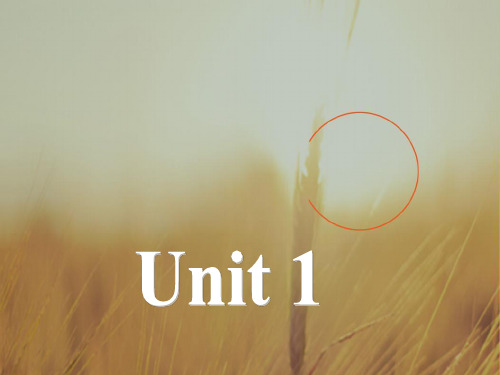
• There are other verbs that can be used in this structure to report imperative sentences:
Personal pronouns: She said, ‘I did some research.’ She said that she had done some research. Ann said, ‘I have finished this letter.’ Ann said that she had finished that letter.
2. 如果直接引语是客观真理,变为间 接引语时,时态不变。 e.g. ‘Light travels much faster than sound,’ she said to me yesterday. She told me the day before that light travels much faster than sound.
2. Questions We use noun clauses introduced by whether/if to report yes/no questions. e.g. Matt asked Ann, ‘Does Jason deserve
this ward?’ Matt asked Ann whether/if Jason deserved this award.
today.’ Tom said he was working there that day.
高中英语 Unit1 Advertising Grammar and usage课件 牛津译林版必修
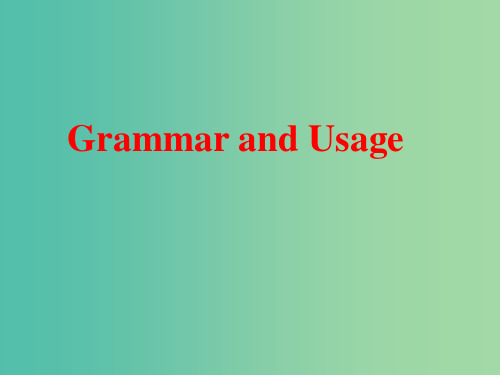
the year before/the previous year, etc.
a week ago
a week before/a week earlier, etc.
Practice: Change the following sentences into reported speech.
We use direct speech to report what exactly has been said. If we write the speech down, the words will usually appear in quotation marks.
1 Which one is direct speech and which one is reported speech? He said, ‘I will go to school tomorrow(.’direct speech) She told us something secret. (reported speech)
1 ‘I will e and see you again this evening, Tom.’ he said. He told Tom that he would go and see him again that evening.
2 ‘I will e here again today,’ she said. She said that she’d go there again that day.
Direct speech
Reported speech
today tomorrow yesterday
高中英语 Unit1 Advertising Grammar and usage教案 牛津译林版必修
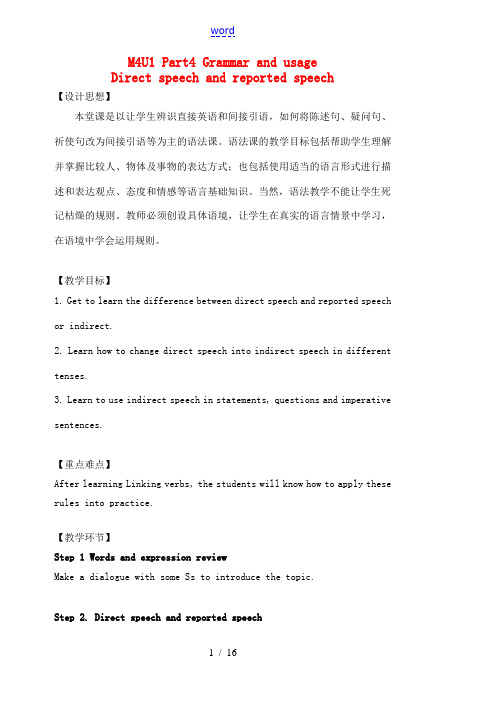
M4U1 Part4 Grammar and usageDirect speech and reported speech【设计思想】本堂课是以让学生辨识直接英语和间接引语,如何将陈述句、疑问句、祈使句改为间接引语等为主的语法课。
语法课的教学目标包括帮助学生理解并掌握比较人、物体及事物的表达方式;也包括使用适当的语言形式进行描述和表达观点、态度和情感等语言基础知识。
当然,语法教学不能让学生死记枯燥的规则。
教师必须创设具体语境,让学生在真实的语言情景中学习,在语境中学会运用规则。
【教学目标】1. Get to learn the difference between direct speech and reported speech or indirect.2. Learn how to change direct speech into indirect speech in different tenses.3. Learn to use indirect speech in statements, questions and imperative sentences.【重点难点】After learning Linking verbs, the students will know how to apply these rules into practice.【教学环节】Step 1 Words and expression reviewMake a dialogue with some Ss to introduce the topic.Step 2. Direct speech and reported speech1. What should we pay attention to when changing direct speech into repored speech?(1) personal pronouns and tense(2 )adverbials of time and place(3 )other casesStep 3. How to use reported speech to report(the style used in writing to report what someone said without repeating their actual words.)【要点】(根据学生情况可作调整)1. 标点符号的变化:He said to me, “Don’t live in London!”= He told me not to live in London.2. 语序的变化:疑问语序变为陈述语序。
高二英语 译林版(2020)选择性必修3 课件- Unit 1 Grammar and usage
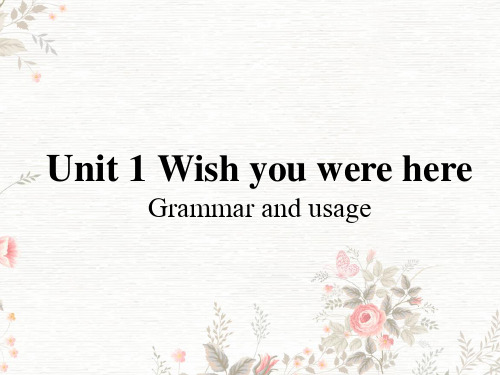
Grammar and usage
Comparing two sentences
1) In the ten provinces and three territories which make up Canada, there is a great diversity in geography.
not go to school.
Working out the rules
1.Many people, some of _w_h_o__m_ are not overweight, are going on a diet.
2.I have been to many big cities, all of _w__h_i_c_h_ have left a deep impression on me.
relative pronoun and adverb _c_a_n__n_o_t_ (can /cannot) be
left out in a non-restrictive relative clause.
1) I live in Nanjing, _w__h_i_c_h__is a big city. 2) I like my English teacher, _w_h__o_ speaks good English. 3) I visit my grandparents at the weekend, _w__h_e_n__ I do
4) The fire lasted for a whole night,
_w__h_i_c_h__c_a_u_s_e_d__g_r_e_a_t_d__a_m__a_g_e_ (这造成了极大的破坏).
译林版高中英语必修三Uint1 Grammar and usage (II) 教案(雅礼版)
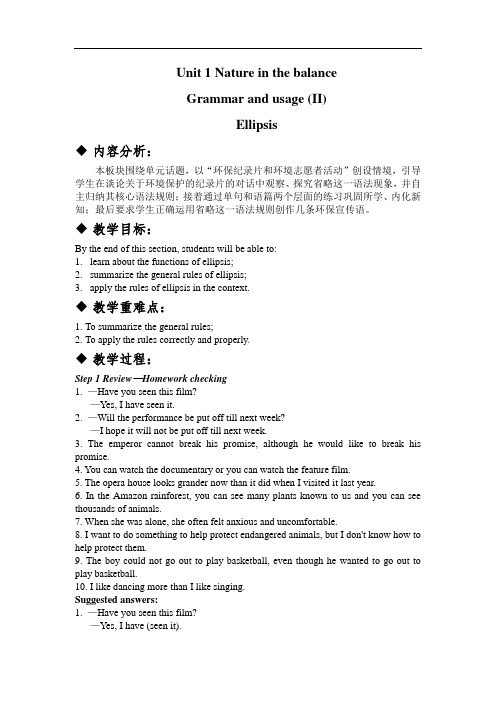
Unit 1 Nature in the balanceGrammar and usage (II)Ellipsis◆内容分析:本板块围绕单元话题,以“环保纪录片和环境志愿者活动”创设情境,引导学生在谈论关于环境保护的纪录片的对话中观察、探究省略这一语法现象,并自主归纳其核心语法规则;接着通过单句和语篇两个层面的练习巩固所学、内化新知;最后要求学生正确运用省略这一语法规则创作几条环保宣传语。
◆教学目标:By the end of this section, students will be able to:1.learn about the functions of ellipsis;2.summarize the general rules of ellipsis;3.apply the rules of ellipsis in the context.◆教学重难点:1.To summarize the general rules;2.To apply the rules correctly and properly.◆教学过程:Step 1 Review—Homework checking1. —Have you seen this film?—Yes, I have seen it.2. —Will the performance be put off till next week?—I hope it will not be put off till next week.3. The emperor cannot break his promise, although he would like to break his promise.4. You can watch the documentary or you can watch the feature film.5. The opera house looks grander now than it did when I visited it last year.6. In the Amazon rainforest, you can see many plants known to us and you can see thousands of animals.7. When she was alone, she often felt anxious and uncomfortable.8. I want to do something to help protect endangered animals, but I don't know how to help protect them.9. The boy could not go out to play basketball, even though he wanted to go out to play basketball.10. I like dancing more than I like singing.Suggested answers:1. —Have you seen this film?—Yes, I have (seen it).2. —Will the performance be put off till next week?—I hope (it will) not (be put off till next week).3. The emperor cannot break his promise, although he would like to (break his promise).4. You can watch the documentary or (you can watch) the feature film.5. The opera house looks grander now than (it did) when I visited it last year.6. In the Amazon rainforest, you can see many plants known to us and (you can see) thousands of animals.7. When (she was) alone, she often felt anxious and uncomfortable.8. I want to do something to help protect endangered animals, but I don't know how (to help protect them).9. The boy could not go out to play basketball, even though he wanted to (go out to play basketball).10. I like dancing more than (I like) singing.【设计意图:复习巩固。
- 1、下载文档前请自行甄别文档内容的完整性,平台不提供额外的编辑、内容补充、找答案等附加服务。
- 2、"仅部分预览"的文档,不可在线预览部分如存在完整性等问题,可反馈申请退款(可完整预览的文档不适用该条件!)。
- 3、如文档侵犯您的权益,请联系客服反馈,我们会尽快为您处理(人工客服工作时间:9:00-18:30)。
2. Tom said to them, ‘ I will get excited.’
Tom told them that he would get excited.
The student said that he hadn’t brought his dictionary.
3. My father said to me, ‘I am reading the book.’
Direct speech
Reported speech
today
tomorrow yesterday next month last year a week ago
the day/yesterday/on Monday, etc.
the next day/the following day/on Friday, etc the day before/the previous day/on Tuesday, etc the month after/the following month/in July, etc the year before/the previous year, etc. a week before/a week earlier, etc.
Practice 2: Change the following sentences into reported speech. 1. ‘I will come and see you again this evening, Tom.’ he said. He told Tom that he would go and see him again that evening. 2. ‘I will come here again today,’ she said. She said that she’d go there again that day. 3. The doctor said to the patient, ‘You will have to wait till 3 pm tomorrow.’ The doctor told the patient that he would have to wait till 3 p.m. the next day.
My father told me that he was reading the book.
What should we pay attention to?
1 personal pronouns and tense learn more 2 adverbials of time and place about it e.g. He said, ‘I lost a key here yesterday.’ He said that he had lost a key there the day before/the previous day. Ex. ‘I read the book here a week ago.’ Jane said to him. Jane told him that she had read the book there a week before.
Unit 1 Advertising Grammar and usage 课件
Lead-in
T: What did you eat this morning?
direct speech
Tom: ‘I ate …’ reported speech T: What did Tom say, Jack? We use direct speech to… report what exactly Jack: He said he ate
Past continuous Past perfect
Present perfect continuous
Past perfect continuous
Present perfect
Байду номын сангаас
Past perfect
Practice 1: Change the following sentences into reported speech. 1. ‘I haven’t brought my dictionary,’ the student said.
She said that that film was quite interesting.
‘Finish the project tomorrow.’ he said to me.
He asked me to finish the project the next day. (Change what has been said to an object clause or an infinitive phrase.)
has been said. If we write the speech down, the words will usually appear in quotation marks.
1. Which one is direct speech and which one is reported speech? He said, ‘I will go to school tomorrow.’ (direct speech) She told us something secret. (reported speech) 2. Change the direct speech into reported speech. She said, ‘This film is quite interesting.’
How to change the tense? Have a look.
Direct Speech
Simple present Present continuous Simple past
Reported speech Simple past
Direct Speech Reported speech Simple future Future in the past Past perfect Past perfect
What should we pay attention to?
personal pronouns and tenses
e.g. Miss Yang said, ‘ I will buy a new dress.’ Miss Yang said that she would buy a new dress. Ex. Simon said, ‘ I wrote a letter.’ Simon said that he had written a letter.
